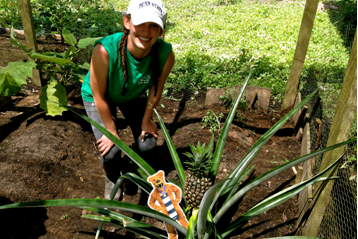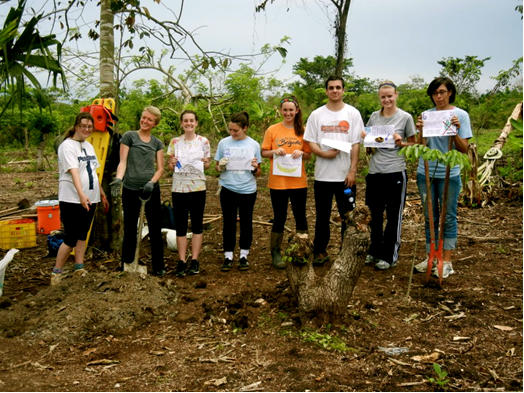Posted: June 17, 2013
I would highlight the collaboration efforts within the PSU Global Environmental Brigades club in addition to those between the club and the Piriati community.

My recent journey to Panama marked my third visit to the country. I came across the Global Brigades organization as a sophomore where I participated in a Business Brigades trip in a community on the Kuna Yala islands. I was so inspired by the organization and community members that am grateful to have met, that I founded Global Environmental Brigades (GEB) at Penn State. Sixteen students traveled with the Environmental Brigades club in January 2012 and helped to construct 5 greenhouses for families in the Piriati Embera community. This past May, GEB returned to Piriati Embera to work with the community members on reforestation and permaculture projects. We spent three intensive days of our trip gathering reforestation materials, digging holes, and planting seedlings. By the end of the week, our group and several community members planted nearly 300 seedlings- plantain, coffee, and wood trees. This reforestation method of planting more than one type of crop in a field is a form of as "permaculture." Permaculture is an ecological and environmental design system that connects humans and the environment, maximizes the efficiency of resource use, and minimizes environmental impact and human labor.
 During our work breaks, our GEB club gave short "charlas," or "chats" in English, on environmental topics to the community members. My mini-team of eight discussed the benefits of compost and how to add a compost mixture to the holes with the seedlings. Compost, which can be made with several materials (in this case soil, chicken feces, and calcium), is beneficial for the environment because it reduces the need for inorganic fertilizers, provides nutrients, and holds moisture.
During our work breaks, our GEB club gave short "charlas," or "chats" in English, on environmental topics to the community members. My mini-team of eight discussed the benefits of compost and how to add a compost mixture to the holes with the seedlings. Compost, which can be made with several materials (in this case soil, chicken feces, and calcium), is beneficial for the environment because it reduces the need for inorganic fertilizers, provides nutrients, and holds moisture.
In addition to working with the Piriati Embera community, our club also had the opportunity to work with another indigenous community in Panama for one day, Embera Peru. We worked with community members to help restore a greenhouse in which we planted plantain and vegetables such as peppers and tomatoes. After the day of work we had lunch with the community and played games with the children.
During our last day of work in Piriati Embera, our group also helped to restore some of the greenhouses that the GEB team constructed last year in the community. We weeded and replanted vegetables in several of the greenhouses. The picture of me above displays a pineapple growing in the sustainable garden of the greenhouse that I helped to build last year.
 On our very last day in Panama we had cultural bonding activities with the community members of Piriati Embera. Our group of nineteen put on a talent show for the community where we memorized and sang a popular song in their Embera language, one of our group members performed a break dancing skit, and we taught the "P-S-U-Woo!" football chant in Spanish. The women of the community also taught us some of their cultural dances.
On our very last day in Panama we had cultural bonding activities with the community members of Piriati Embera. Our group of nineteen put on a talent show for the community where we memorized and sang a popular song in their Embera language, one of our group members performed a break dancing skit, and we taught the "P-S-U-Woo!" football chant in Spanish. The women of the community also taught us some of their cultural dances.
Looking back at the trip experience I feel that I have improved my skills of communication, leadership, and cultural appreciation. As the President of the club, I had to recruit passionate students and make sure that they were fully informed about all club matters from fundraising opportunities to the necessary items to pack. Not only was I able to improve communication with the students in our group, but also with the community members of Piriati. Working on the reforestation projects allowed me to move outside of my comfort zone and practice my Spanish. Despite not being fluent, I was still able to bond with the community members and our advisers that spoke Spanish. When explaining this experience to a potential employer, I would highlight the collaboration efforts within the PSU Global Environmental Brigades club in addition to those between the club and the Piriati community. Our week in Panama was an extremely fun learning experience where we had the opportunity to work alongside and bond with those of a different culture. I will certainly never forget my experiences in Piriati and hope to return during my post-undergraduate journey.
Ag Sciences Global
Address
106 Agricultural Administration BuildingUniversity Park, PA 16802
- Email globalag@psu.edu
- Office 814-863-0249
- Fax 814-865-3055
Ag Sciences Global
Address
106 Agricultural Administration BuildingUniversity Park, PA 16802
- Email globalag@psu.edu
- Office 814-863-0249
- Fax 814-865-3055

